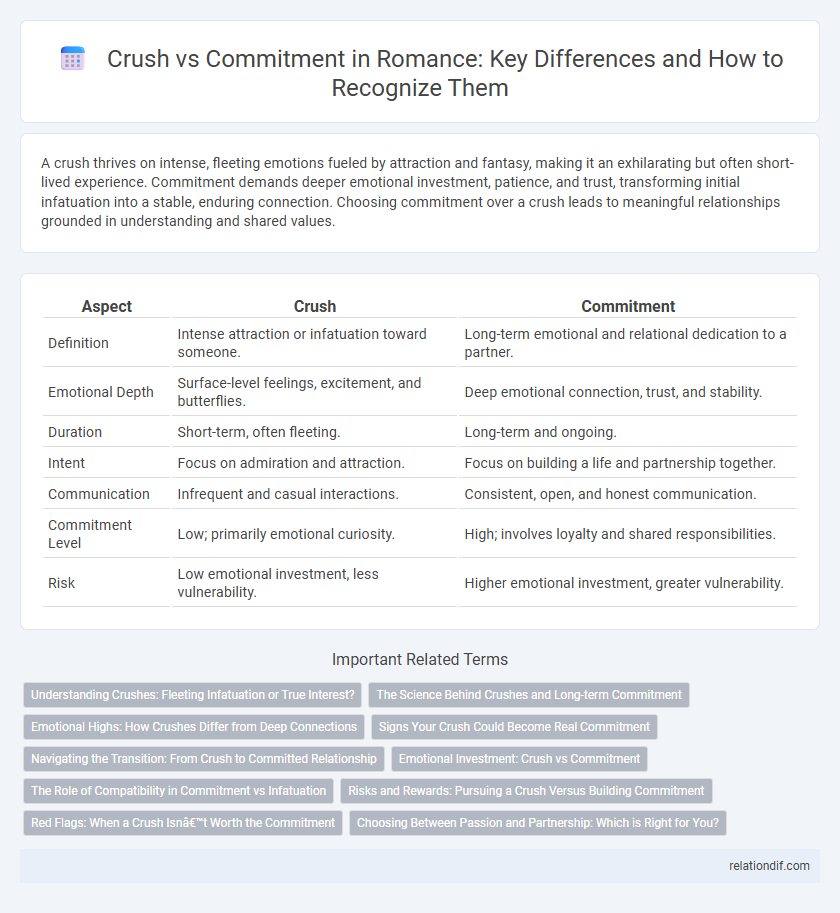A crush thrives on intense, fleeting emotions fueled by attraction and fantasy, making it an exhilarating but often short-lived experience. Commitment demands deeper emotional investment, patience, and trust, transforming initial infatuation into a stable, enduring connection. Choosing commitment over a crush leads to meaningful relationships grounded in understanding and shared values.
Table of Comparison
| Aspect | Crush | Commitment |
|---|---|---|
| Definition | Intense attraction or infatuation toward someone. | Long-term emotional and relational dedication to a partner. |
| Emotional Depth | Surface-level feelings, excitement, and butterflies. | Deep emotional connection, trust, and stability. |
| Duration | Short-term, often fleeting. | Long-term and ongoing. |
| Intent | Focus on admiration and attraction. | Focus on building a life and partnership together. |
| Communication | Infrequent and casual interactions. | Consistent, open, and honest communication. |
| Commitment Level | Low; primarily emotional curiosity. | High; involves loyalty and shared responsibilities. |
| Risk | Low emotional investment, less vulnerability. | Higher emotional investment, greater vulnerability. |
Understanding Crushes: Fleeting Infatuation or True Interest?
Crushes often ignite intense emotions based on attraction and fantasy, but they tend to be fleeting and less grounded in reality compared to commitment. Understanding the neurological and psychological roots of infatuation reveals it activates dopamine-driven reward pathways, which can fade as familiarity grows. True interest develops through consistent emotional connection, shared values, and trust, marking a deeper, sustainable bond beyond initial excitement.
The Science Behind Crushes and Long-term Commitment
Neuroscientific studies reveal that crushes activate the brain's reward system, flooding it with dopamine and creating intense feelings of euphoria and obsession. In contrast, long-term commitment engages oxytocin and vasopressin pathways that promote bonding, trust, and emotional stability over time. Understanding these distinct neurochemical processes explains why crushes are transient and thrilling, whereas committed relationships foster deep connection and resilience.
Emotional Highs: How Crushes Differ from Deep Connections
Crushes trigger intense emotional highs marked by excitement and uncertainty, often fueled by idealized perceptions and dopamine surges. In contrast, deep commitments cultivate stable emotional bonds rooted in trust, vulnerability, and mutual understanding, resulting in sustained emotional fulfillment. Neuroscientific studies reveal that crushes activate brain regions tied to reward processing, while committed love engages areas associated with long-term bonding and attachment.
Signs Your Crush Could Become Real Commitment
Consistent communication and genuine interest in your daily life indicate your crush might evolve into a real commitment. Shared values and emotional support during challenging times are strong signs that the connection is deepening beyond infatuation. Mutual efforts to plan future activities together highlight the potential for a lasting, committed relationship.
Navigating the Transition: From Crush to Committed Relationship
Navigating the transition from crush to committed relationship requires clear communication and mutual understanding of expectations. Emotional intimacy grows through shared experiences and vulnerability, shifting the focus from infatuation to deeper connection. Recognizing red flags early and fostering trust are crucial steps in building a sustainable partnership.
Emotional Investment: Crush vs Commitment
Emotional investment in a crush is often intense but fleeting, driven by idealized perceptions and excitement, whereas commitment requires deeper emotional engagement, trust-building, and consistent support over time. Crushes trigger dopamine and serotonin surges, creating feelings of euphoria that can fade quickly, while commitment fosters oxytocin release, strengthening bonds and promoting long-term attachment. Understanding these distinct emotional processes helps clarify why romantic relationships evolve from passionate infatuation to stable partnerships.
The Role of Compatibility in Commitment vs Infatuation
Compatibility plays a crucial role in transitioning from infatuation to a lasting commitment by fostering emotional understanding, shared values, and effective communication. Infatuation often revolves around idealized perceptions and intense attraction, which can mask fundamental differences that challenge long-term stability. Sustainable relationships thrive when partners align on core beliefs, lifestyle preferences, and conflict resolution styles, ensuring compatibility strengthens commitment beyond the fleeting excitement of a crush.
Risks and Rewards: Pursuing a Crush Versus Building Commitment
Pursuing a crush offers the thrill of instant attraction and excitement but carries risks like idealization and fleeting emotions that may lead to disappointment. Building commitment involves deeper emotional investment, fostering trust and stability, yet requires patience and vulnerability that can feel challenging. Evaluating these risks and rewards helps individuals balance passion with long-term relationship goals for sustained romantic fulfillment.
Red Flags: When a Crush Isn’t Worth the Commitment
Obsessing over a crush often blinds individuals to red flags like inconsistent communication, lack of effort, or emotional unavailability that indicate potential relationship challenges. Commitment requires evaluating these warning signs to avoid investing time and feelings in someone unwilling or unable to reciprocate sincere love. Recognizing early patterns such as frequent cancelations or disrespect can save emotional energy and foster healthier, more stable romantic connections.
Choosing Between Passion and Partnership: Which is Right for You?
Choosing between a crush and commitment involves weighing intense passion against enduring partnership. Crushes ignite strong emotions and excitement but often lack stability, whereas commitments foster trust, mutual support, and long-term growth. Understanding your personal values and relationship goals helps determine whether fleeting attraction or lasting connection aligns better with your romantic fulfillment.
crush vs commitment Infographic

 relationdif.com
relationdif.com